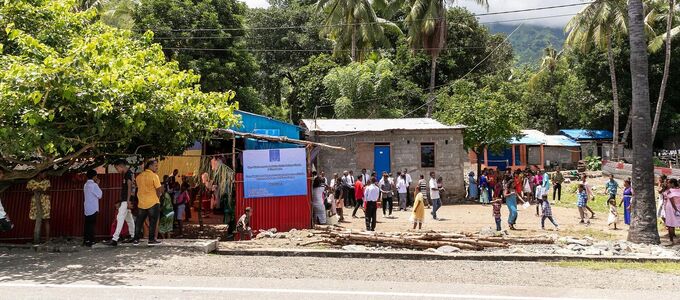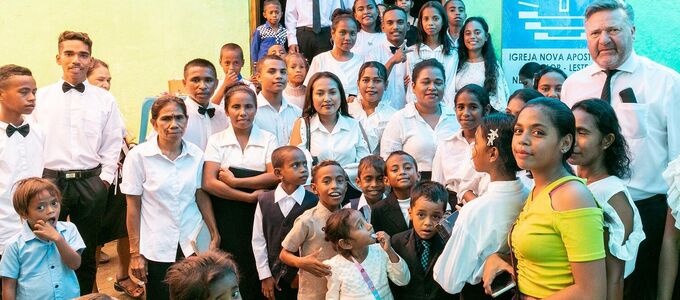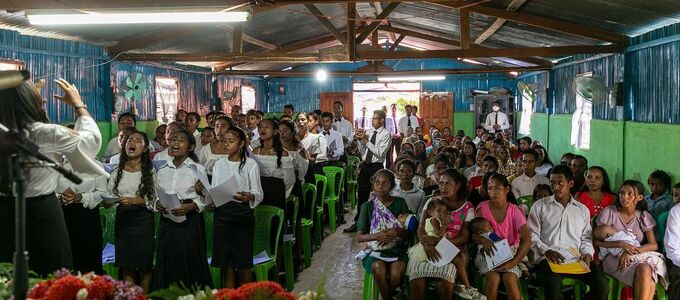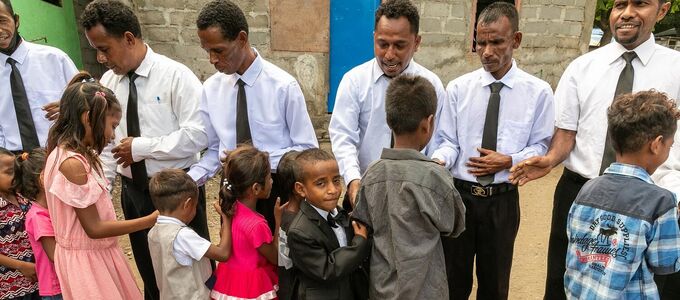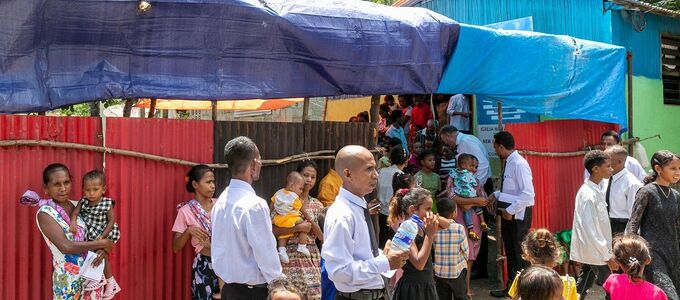
It took several attempts, but the New Apostolic Church finally managed to gain a foothold in East Timor. Jean-Luc Schneider is the first Chief Apostle to visit the country in South-East Asia.
According to legend, the island of Timor is said to have formed from a crocodile—to explain how it got its curious shape. The inguinal crocodile, which is native to the island’s rivers and the sea, is known as Grandfather Crocodile and is revered by the people.
There must have been inhabitants on this South-East Asian island, which lies between Indonesia and Australia, at least 43,000 years ago already. This is proven by finds in local caves. Sensational artefacts have been found in the country which prove that deep-sea fishing was already practised there 42,000 years ago. The oldest fishhook was also found there. Nowadays, though, there is hardly any fishing because of the crocodiles.
An often-occupied piece of land
People lived together in three loosely connected kingdoms on the territory of present-day East Timor more or less peacefully until the Portuguese arrived on the island for the first time in 1515. They founded their first settlement in Lifau in 1556 and thus their colony of Portuguese Timor. This period was characterised by constant uprisings.
At the end of the Second World War, Portuguese Timor was occupied by Japan. Like Indonesia, the western half of the island was occupied by the Netherlands. When Indonesia became independent and a separate state in 1945, this part of the island was free, while East Timor was still a Portuguese overseas province. In 1976, Indonesia declared the eastern part of the island as one of its own provinces. Between 1977 and 1979, during the Indonesian occupation of Timor, a third of the Timorese died of hunger or illness or because of fighting against the occupying forces and their measures. The referendum on independence in 1999 was initially followed by further fighting.
The first two visits by an Apostle
During this time, the New Apostolic Church set food on East Timor for the first time in the person of the then Apostle Armin Brinkmann. The timing could not have been worse, as the Apostle was caught in the middle of the clashes between pro-Indonesian militias, regular armed forces, and the population. Resistance fighters even kidnapped him in order to get him to tell the world about the situation in their country.
The country had been under UN administration since the end of 1999, so Apostle Brinkmann risked a second trip in 2000. He made contact with East-Timorese who lived in Portugual, which belonged to his working area. Senhor Pacheco, a Timorese living in Lisbon, gave him a few addresses, which he went to see one after the other.
The Church begins to gain a foothold
The lush green landscape, the many trees and tropical plants on the mountainous island reminded Apostle Brinkmann of the island of São Tomé and Príncipe in West Africa. This led to the idea of sending the Portuguese-speaking ministers from there to East Timor.
In May 2002 the country of East Timor became independent and in March 2003 the Apostle and two district leaders flew from São Tomé and Portugal to Dili, the capital of East Timor. They rented a house, registered the New Apostolic Church in the predominantly Catholic country, and set up a room for the divine service. Apostle Brinkmann conducted a first divine service there with six guests.
Divine services on the island
Before colonisation, the people of East Timor were animists, meaning they believed that living beings as well as inanimate objects had a soul. Today, 97 per cent of Timorese are Catholic. Also because the Catholic Church was a support in the process of national liberation. Important clergy preached against the human rights violations, even though they were putting themselves in danger. However, traditional beliefs still play a role in everyday life and some rituals are integrated into the Christian faith.
For the divine service on the Apostle’s fourth journey in August 2003, many believers from neighbouring villages had set off early in order to be there on time. Apostle Brinkmann conducted the divine service with 74 participants. The sermon was also translated into the second national language, Tetum. Forty-five believers received the sacrament of Holy Sealing, and two Priests and three Deacons were ordained.
Ongoing development
“There are still many towns and villages into which the testimony of God’s activity must be carried.” This is what the later District Apostle Brinkmann said after this trip. Today, the New Apostolic Church in East Timor has almost 800 members in ten congregations, which are looked after by 24 ministers.
Almost half of all members can come to the divine service in Dili. “Preparations are in full swing,” says the responsible Apostle Dimitrios Diniz. “We have two organists and a central choir. On Saturday, our Chief Apostle will conduct a divine service for ministers and their spouses and some teachers in our congregation in Bairro Pité, a city quarter of Dili. The brothers and sisters will come from all over the country. On Sunday, our Chief Apostle will conduct a divine service at the Delta Hall in Dili; our brothers and sisters will have to set off early and will be travelling by bus from all over the country.”






